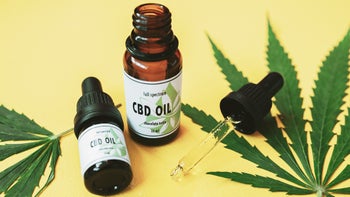
Is It Legal for Doctors to Prescribe Medical Cannabis?
Key takeaways:
Doctors can’t prescribe medical cannabis (medical marijuana) like they do conventional medications. That’s because these products are not FDA-approved and are still illegal under federal law.
Doctors can recommend the use of medical cannabis products for certain conditions in many — but not all — states. Depending on where you live, this recommendation will allow you to legally buy medical cannabis from dispensaries.
There are some cannabis-related medications that are FDA-approved for the treatment of specific conditions, like seizures and chemotherapy side effects. You can’t get these medications at a dispensary.

Medical cannabis is becoming more popular in the U.S. because of growing evidence about its many health benefits. But medical doctors are not able to prescribe medical cannabis in the same way as conventional pharmaceutical medications.
What is medical cannabis?
There’s no difference between medical cannabis and nonmedical cannabis as far as the actual plant is concerned. Medical cannabis simply refers to cannabis that is sold through a state-regulated program.
Cannabis contains active chemicals called cannabinoids and has many potential health benefits. Cannabis is the scientific name for the plant, but it’s also known by slang terms like weed and bud. Marijuana is an outdated term that’s no longer used due to its racially charged roots.
Search and compare options
Medical cannabis is legal in dozens of states, but it’s illegal under federal law. Most states require a doctor’s recommendation in order for people to buy medical cannabis products.
Medical cannabis comes in many different types of products, including:
Smokeable dried flower
Concentrated cannabis oils
Infused foods
Capsules
Sublingual liquids
Pre-rolled joints
Medical cannabis vs. industrial hemp products
Medical cannabis is different from the many industrial hemp products that you may find over the counter in nonspecialized stores. Congress legalized these products in 2018. By law, these products cannot contain more than 0.3% THC by weight.
Medical cannabis vs. prescription cannabis medications
Medical cannabis is also different from prescription cannabis medications that have been evaluated and approved by the FDA for specific medical conditions, such as seizure disorders and chemotherapy side effects.
The FDA has approved one medication that is derived directly from cannabis plants, called Epidiolex (cannabidiol). The FDA has also approved synthetic cannabinoid medications, like Marinol (dronabinol) and Cesamet (nabilone), which contain lab-made chemicals designed to mimic THC.
Read more like this
Explore these related articles, suggested for readers like you.
Is medical cannabis FDA-approved?
While the FDA has approved some prescription cannabis medications, it has not approved any of the medical cannabis products found at dispensaries across the country.
The FDA approves all prescription medications in the U.S. This approval process requires extensive testing involving humans. This testing ensures that medications are both effective and safe for human consumption.
Medical cannabis products found at dispensaries have not undergone clinical trials involving humans.
What conditions is medical cannabis recommended to treat?
The medical cannabis that is sold at dispensaries is used for a wide variety of conditions. Evidence is limited as to how well medical cannabis works. So most of the information about the possible benefits of medical cannabis comes from people who use it.
Here are some of the most common conditions and symptoms medical cannabis is used for:
Chronic pain
Multiple sclerosis
Cancer
Irritable bowel disease
Epilepsy
Chemotherapy-induced nausea and vomiting
Anxiety
Insomnia
As mentioned previously, medical cannabis products have not been evaluated or approved by the FDA.
How does a medical cannabis prescription work?
Medical cannabis is not prescribed like conventional pharmaceutical medications. Usually, healthcare providers write prescriptions for medications. A prescription is a legal document that gives you the right to purchase a prescription medication. It’s also a detailed description of the exact medication and dosage your healthcare provider wants you to take.
Healthcare providers can write prescriptions for FDA-approved cannabis medications like Epidiolex or Cesamet. But the medical cannabis sold at dispensaries is illegal under federal law. This means that doctors are not able to write prescriptions for it.
Most medical cannabis laws are passed through ”compassionate use” acts. These acts allow doctors to talk to people about medical cannabis if they think it might be a good option for them. Most states require some sort of documentation of this in order for people to buy medical cannabis. Since legally this can’t be a “prescription,” it’s usually referred to as a “recommendation” for medical cannabis.
Unlike prescriptions, recommendations may not include a specific cannabis product or dosage. This can be frustrating for people who aren’t familiar with cannabis, as they aren’t sure what they should purchase when they go to a dispensary. It also puts budtenders (people who work at dispensaries), who usually aren’t formally trained, in a position to recommend cannabis products to people with complex health conditions.
Several states require that dispensaries employ pharmacists to help bridge this gap. But formal medical training in cannabis is still hard to come by, and even pharmacists don’t always know how to choose the right cannabis products for different medical conditions.
Who is eligible for medical cannabis?
You need to have a medical condition to be eligible for medical cannabis. Chronic pain is the most common reason people use medical cannabis. Multiple sclerosis, chemotherapy-induced nausea and vomiting, and cancer are other common reasons.
Until recently, most states had a list of qualifying conditions for medical cannabis. For example, in Alabama, 15 different types of conditions qualified for medical cannabis access, including any terminal illness. In Washington state, there were more than 12 types of qualifying conditions, including glaucoma and post-traumatic stress disorder (PTSD).
But medical cannabis laws are constantly changing. Now, many states are scrapping their lists of qualifying conditions or allowing licensed practitioners to recommend cannabis for any health condition they deem appropriate. National Organization for the Reform of Marijuana Laws (NORML), a cannabis advocacy organization, maintains a list of which states have medical cannabis laws and how patients can qualify.
What states allow medical practitioners to recommend cannabis?
California became the first state to legalize medical cannabis in 1996. Now, 37 states and the District of Columbia have legalized medical cannabis, including the entire West Coast and most of the Northeast. But even in these states, practitioners typically need to opt in to medical cannabis programs.
In most states where medical cannabis is legal, healthcare providers need to get trained and become licensed before they can provide recommendations. This training isn’t just reserved for doctors. Depending on the state, nurse practitioners, physicians assistants, dentists, and midwives can all be licensed, provided they get the required training.
To learn if your state allows access to medical cannabis check the website of the National Conference of State Legislatures.
How do I get access to medical cannabis?
Medical cannabis is legal in over 37 states and the District of Columbia. Every state has different rules for accessing medical cannabis.
For example, here is how to access medical cannabis in Oklahoma:
Acquire all relevant documents, including: a physician’s recommendation form, digital photo, proof of identity, proof of Oklahoma residency.
Create an online account with the Oklahoma Medical Marijuana Authority.
Pay a $100 non-refundable application fee.
Normally, you must be a resident of a state in order to qualify for medical cannabis there. But some states, like New York, make an exception for people who are temporary residents for the purpose of medical treatment.
Keep in mind that most medical cannabis programs are state-specific. There are only a handful of states that will allow people to buy cannabis with medical cards from another state. This can make it challenging for people who travel frequently to access medical cannabis. It’s currently federally illegal to take cannabis across state lines.
What is the difference between medical cannabis and recreational cannabis products?
The main difference between medical and recreational (adult-use) cannabis has to do with legality. Recreational cannabis is legal in 19 states, 2 territories, and the District of Columbia. And, in those states, recreational cannabis products are available to anyone over the age of 21.
Medical cannabis and recreational cannabis products themselves are very similar. Both medical and recreational cannabis come in multiple formats, including:
Dried flower
Infused foods
Infused oils
Capsules
Sublingual liquids
Vaporizers
Pre-rolled joints
Both categories of products can be high in THC, high in CBD, or contain other cannabinoids. Finding the right ratio between THC and CBD is an important part of selecting the best medical cannabis products for you.
Recreational cannabis does not require a doctor’s recommendation, but it can still be used medically.
What are the benefits of having a medical cannabis card?
Enrolling in a medical cannabis program has many advantages, even if you already have access to adult-use cannabis dispensaries. Here are some of these benefits:
Lower costs: People who use medical cannabis are frequently excluded from paying certain taxes on the products. They may also be able to submit claims to state workers’ compensation programs or flexible spending accounts and health savings accounts for reimbursement.
Different products: Through a medical cannabis program, people may have access to different dosage forms or higher-potency products, depending on the state. For example, cannabis edibles in Massachusetts’ adult-use market cannot contain more than 5 milligrams of THC per serving. But there is no potency limit for medical cannabis edibles sold in the state.
Larger purchase limits: People in medical cannabis programs can often purchase more cannabis in a day than people in recreational cannabis markets. In Washington, customers with a medical card can purchase up to 3 ounces of cannabis at a time, but those without can only purchase 1 ounce.
Lower age restrictions: Adult-use cannabis is available only to people over the age of 21. But many states allow underage people to access medical cannabis with a doctor’s recommendation.
Clinical oversight: In most states, you must discuss cannabis use with a healthcare provider to obtain your medical card. This helps screen for potential risks or interactions. Some states also require medical cannabis dispensaries to employ pharmacists to help guide people to the right products for their needs.
When should I talk to my doctor about getting prescribed medical cannabis?
If you think you meet your state’s criteria for medical cannabis, start by speaking to your provider. They can help you get a medical cannabis authorization if they believe you can benefit from it. If they’re not comfortable writing a recommendation, or not registered to do so, you can also seek out local healthcare providers who specialize in medical cannabis.
There are other advantages to talking to a healthcare provider about medical cannabis, beyond simply accessing it. Cannabinoids interact with some prescription medications in dangerous ways. And medical cannabis carries other risks, like addiction, dry mouth, and sleepiness. Having a conversation about the risks and benefits before you get started can help keep you safe while taking cannabis.
While budtenders can offer a lot of information on cannabis products, it’s also common for people who work in the cannabis industry to make incorrect statements about cannabis and the effects of cannabinoids. So make an appointment with your healthcare provider to kickstart the conversation about medical cannabis.
The bottom line
Doctors in the U.S. are only able to write prescriptions for FDA-approved prescription cannabis medications, which are not the same as the products found at medical cannabis dispensaries. Medical cannabis products sold in dispensaries are not FDA-approved and remain illegal under federal law.
However, doctors have a legal right to discuss any cannabis products with their patients, and there are many situations in which safe and careful use of medical cannabis products can ease symptoms and improve health. In many — but not all — states, a doctor can give you a recommendation for medical cannabis, which will allow you to access a wide range of products at your local dispensary.
Why trust our experts?



References
Alabama Medical Cannabis Commission. (n.d.). Patients and caregivers.
Antoniou, T., et al. (2020). Drug interactions with cannabinoids. Canadian Medical Association Journal.
Boehnke, K. F., et al. (2019). Qualifying conditions of medical cannabis license holders in the United States. Health Affairs.
Cahill, S. P., et al. (2021). Evaluation of patient reported safety and efficacy of cannabis from a survey of medical cannabis patients in Canada. Frontiers in Public Health.
Cannabis Control Commission Massachusetts. (2021). Adult use of marijuana.
Cannabis Control Commission Massachusetts. (2021). Medical use of marijuana.
Cogan, P. S. (2020). Practical considerations of hypotheses and evidence in cannabis pharmacotherapy: Refining expectations of clinical endocannabinoid deficiency. Journal of Dietary Supplements.
Federation of Tax Administrators. (2022). Status of state taxation/sales of marijuana.
Forster, V. (2018). FDA approves first-ever drug directly purified from cannabis. Forbes.
Gregorio, J. (2014). Physicians, medical marijuana, and the law. AMA Journal of Ethics.
Hartman, M. (2022). Cannabis overview. National Conference of State Legislatures.
Hudak, J. (2018). The Farm Bill, hemp legalization and the status of CBD: An explainer. The Brookings Institution.
Mercurio, A., et al. (2019). Marijuana as a substitute for prescription medications: A qualitative study. Substance Use & Misuse.
Mikos, R. A., et al. (2019). Has the “M” word been framed? Marijuana, cannabis, and public opinion. PLOS ONE.
National Conference of State Legislatures. (2022). State medical cannabis laws.
National Organization for the Reform of Marijuana Laws. (n.d.). Medical marijuana laws.
New York State Office of Cannabis Management. (n.d.). Access the medical cannabis data management system (MCDMS).
ProCon.org. (2022). State-by-state medical marijuana laws.
Society of Cannabis Clinicians. (n.d.). Find a practitioner.
Thorne, G. (2022). When medical cannabis makes sense in California. Harris Bricken.
U. S. Food & Drug Administration. (2022). Development and approval process.
U. S. Food & Drug Administration. (2022). Expanded access.
Washington State Department of Health. (n.d.). Medical cannabis possession amounts.
Washington State Department of Health. (n.d.). Medical cannabis qualifying conditions.
Keep in mind that cannabinoids are legal in some states for personal and/or medicinal use, but not in others. Certain cannabinoids are still illegal under federal law.





























